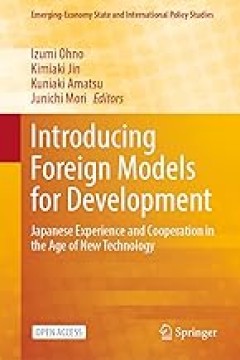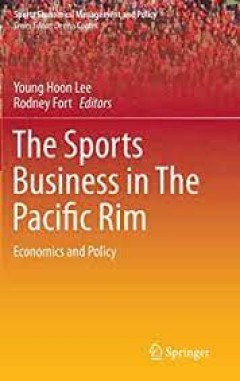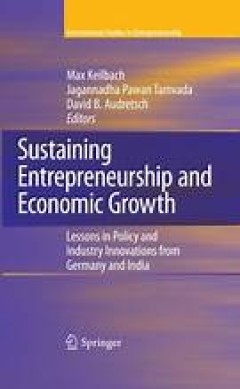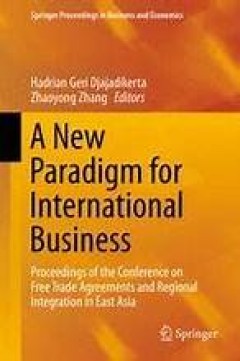Filter by

Rethinking Economic Growth Theory From a Biophysical Perspective
Neoclassical growth theory is the dominant perspective for explaining economic growth. At its core are four implicit assumptions: 1) economic output can become decoupled from energy consumption; 2) economic distribution is unrelated to growth; 3) large institutions are not important for growth; and 4) labor force structure is not important for growth. Drawing on a wide range of data from the ec…
- Edition
- -
- ISBN/ISSN
- 978-3-319-12826-9
- Collation
- -
- Series Title
- -
- Call Number
- -

EU Cohesion Policy Implementation - Evaluation Challenges and Opportunities
This open access book is the result of the 1st International Conference on Evaluating Challenges in the Implementation of EU Cohesion Policy (EvEUCoP 2022). It presents the recent findings, sparks discussion, and reveals new research paths addressing the use of novel methodologies and approaches to tackle the challenges and opportunities that are unveiled with the implementation of the EU cohes…
- Edition
- 1
- ISBN/ISSN
- 978-3-031-18161-0
- Collation
- -
- Series Title
- Springer Proceedings in Political Science and International Relations
- Call Number
- XII, 193

Rethinking Economic Growth Theory From a Biophysical Perspective
Neoclassical growth theory is the dominant perspective for explaining economic growth. At its core are four implicit assumptions: 1) economic output can become decoupled from energy consumption; 2) economic distribution is unrelated to growth; 3) large institutions are not important for growth; and 4) labor force structure is not important for growth. Drawing on a wide range of data from the ec…
- Edition
- -
- ISBN/ISSN
- 978-3-319-12826-9
- Collation
- -
- Series Title
- -
- Call Number
- -

Introducing Foreign Models for Development
This open access book studies how foreign models of economic development can be effectively learned by and applied to today’s latecomer countries. Policy capacity and societal learning are increasingly stressed as pre-conditions for successful catch-up. However, how such learning should be initiated by individual societies with different features needs to be explained. The book answers this p…
- Edition
- -
- ISBN/ISSN
- 978-981-99-4237-4
- Collation
- XXVI, 338
- Series Title
- -
- Call Number
- -

The Science and Technology Labor Force
This book provides an in-depth analysis of the demand for PhDs on the labor markets of twelve countries. The authors analyze the role of PhDs in the creation of innovation in a knowledge-based economy and examine economic issues such as the return on investment for the education and training of doctoral graduates. To provide a more comprehensive picture of the employment patterns, career paths …
- Edition
- 1
- ISBN/ISSN
- 978-3-319-27210-8
- Collation
- -
- Series Title
- -
- Call Number
- -

The emergence and evolution of prokaryotic cells :how molecular forces and ro…
"An original physicochemical contribution to the problem of understanding life and its emergence, incorporating concepts from planetary sciences, chemistry and biology"--OCLC-licensed vendor bibliographic record.
- Edition
- -
- ISBN/ISSN
- 9780262363044
- Collation
- 1 online resource.
- Series Title
- -
- Call Number
- -

GrowthFrom microorganisms to megacities
OCLC-licensed vendor bibliographic record.
- Edition
- -
- ISBN/ISSN
- 9780262354516
- Collation
- 1 online resource (688 pages).
- Series Title
- -
- Call Number
- -

The Sports Business in the Pacific Rim Economics and Policy
Following consistent and rapid general economic growth, Pacific Rim countries have grown as a major force in sports. Australia, China, Japan and Korea populated the top ten medals list at the 2012 London Olympics. Pacific Rim countries are major consumers of international sports and domestic professional sports have expanded continuously over time. Nippon Professional Baseball and the Korean Ba…
- Edition
- -
- ISBN/ISSN
- 978-3-319-10037-1
- Collation
- -
- Series Title
- -
- Call Number
- -

Sustaining Entrepreneurship and Economic Growth
Academic research on developed countries has scientifically evaluated the role of entrepreneurship on economic growth, market expansion, commercializing innovation, and reducing unemployment. In this research, regions or industries with higher rates of entrepreneurship show higher levels of innovation and economic growth. The literature on entrepreneurship and innovation has largely ignored dev…
- Edition
- 1
- ISBN/ISSN
- 978-0-387-78695-7
- Collation
- Ekonomi
- Series Title
- -
- Call Number
- 330

A New Paradigm for International Business
This book offers a collection of studies on regional integration and the dynamic business environment in East Asia. The papers included, originally presented at the 2014 Asia Pacific Business Conference on "Free Trade Agreements and Regional Integration in East Asia," examine the challenges and dynamics in the increasingly integrated East Asian markets and outline a new paradigm for doing inter…
- Edition
- 1
- ISBN/ISSN
- 978-981-287-499-3
- Collation
- Business Management
- Series Title
- -
- Call Number
- 650
 Computer Science, Information & General Works
Computer Science, Information & General Works  Philosophy & Psychology
Philosophy & Psychology  Religion
Religion  Social Sciences
Social Sciences  Language
Language  Pure Science
Pure Science  Applied Sciences
Applied Sciences  Art & Recreation
Art & Recreation  Literature
Literature  History & Geography
History & Geography